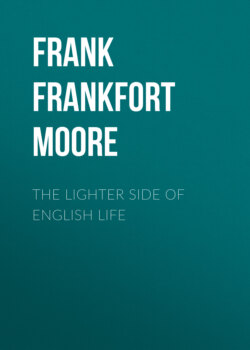Читать книгу The Lighter Side of English Life - Frank Frankfort Moore - Страница 7
На сайте Литреса книга снята с продажи.
II.—THE CENTENARIANS
ОглавлениеTable of Contents
More recently still another busybody endeavoured to deprive the village of the reputation which it had long enjoyed as the centre of English longevity. Now it would be impossible for any one to study the dates on the tombstones in the churchyard without noticing how great was the number of centenarians who died within the first fifty years of the nineteenth century in the parish of Thurswell. There were apparently eighteen men and fourteen women interred after passing their hundredth year; indeed, one woman was recorded to have reached her hundred and twenty-seventh year, which is a good age for a woman. The people were naturally very proud of the constant references made in print to their longevity; but one day there came down to the village a member of the Statistical Society, and after busying himself among the musty parish registers for a month, he announced his discovery that in every case but one the date of the birth of the alleged centenarians was the date of the birth of their parents. The investigator had noticed that all the alleged centenarians had “departed this life” during the rectorship of the Rev. Thomas Ticehurst, and centenarianism had always been his fad. He had preached sermon after sermon on Methuselah and other distinguished multi-centenarians, and he spent his time travelling about the country in search of evidence in confirmation of the theory that Methuselah, though somewhat beyond the average in respect of age, might yet have been exceeded on his own ground by many people living in the country districts of England. Nothing was easier, the investigator tried to show, than for a clergyman in charge of the registers, who had such a hobby, to assume, when any very old man or woman died in his parish, that he or she actually was twenty years or so older; and as the Christian names were nearly always hereditary, in nine cases out of ten he accepted the registry of the birth of the father as that of the lately deceased man, and the date of the birth of the mother in regard to the aged woman, the result being a series of the most interesting inscriptions.
I must confess that I myself felt that I had a personal grievance against this busybody statistician. There is nothing so comforting to the middle-aged as a stroll through a cemetery of centenarians; and I had the most uncharitable feelings against the person who could make such an attempt to deprive me of the pleasant hope of living another sixty or seventy years.
But while we were still talking about the danger of permitting strangers to have access to the registers, I was told one morning that a man who had once been the gardener at the place which I had just acquired would like to see me. Now, I had had already some traffic with the superannuated gardener of my predecessor, and so I was now surprised to find myself face to face with quite a different person.
“You were not the gardener here,” I said. “I saw him; his name is Craggs, and he still lives in the hollow.”
“Oh ay, Jonas Craggs—young Joe, we called him; I knew his father,” replied my visitor. “He was only here a matter of six-and-thirty years. I was superann'ated to make way for him. Young-Joe, we called him, and I was curious to see how things had come on in the garden of late.”
“You were superannuated thirty-six years ago,” said I. “What age are you now?”
“I'm ninety-eight, sir,” he replied with a smirk.
